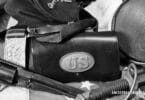Hessian soldiers played a large role in the American Revolutionary War. They were hired mercenaries, used by the British to fight American colonial forces. The Hessian soldiers were known for their brutality during the American Revolution. They were highly trained soldiers and had a “take no prisoners” attitude. They were being paid to kill, not take people prisoner, and they took this job very seriously. They had every reason to be as ruthless as they could, as the British paid them well for what they did. The brutality of the Hessians even made it into popular culture in the story, “The Legend of Sleepy Hollow,” where the man who would become the Headless Horseman was a Hessian soldier fighting Colonial troops in the American Revolution.
There were over 30,000 German troops hired by the British to fight the colonials. Most of these soldiers came from the German state of Hesse-Cassel, though some of those German soldiers who fell under the general term of “Hessian” came from other German states. Germany was not a unified country at this time, but a collection of independent states that were under a loose coalition with each other, with a common religion, language, and customs.
Hiring foreign mercenaries has long been a tactic used in wars, and the American Revolution was no exception. It is a practice that goes back almost to the dawn of human history. During the time of the American Revolution, soldiers were a major source of export income for Hesse-Cassel. Their soldiers were tough, well-trained, and had a proven reputation for getting the job done. They were in demand not just in the Revolutionary War, but in other wars around Europe, as well. The income they brought in was equal to 13 years’ worth of tax money for Hesse-Cassel. With Hessian soldiers fighting abroad, the Hesse-Cassel prince, Friedrich II, was able to keep taxes low and spend a lot of money on public works projects in the state, which kept the citizens happy. Friedrich was even able to offer public welfare and public education with the money the Hessian soldiers were bringing into their home state. It was a winning proposition for everyone in Hesse-Cassel for them to be hired out as soldiers in foreign wars.
The Hessians made good use of their reputation as formidable soldiers. All boys in the state were required to register for military service when they were seven years old. They trained as soldiers from that time until they were sixteen when they became regular parts of the Hessian army. Each year, all Hessian men ages 16 to 30 were required to go before a military board to be possibly selected for military service. There were some who were given exemptions from serving because their regular occupations were needed at home. Anyone who did not have an occupation that was vital to the operations of Hesse-Cassel was a potential military recruit. Those who were not in school, who was bankrupt, unemployed, and other people who were considered “expendable” could be called up to military service at any time, even if it wasn’t the annual presentation time.
While the Hessian army was a tough one to be in, it offered benefits to the ones who were chosen to go on military campaigns. Discipline in the army was strict, with harsh punishments for breaking the rules. Morale was high, though, because opportunities for promotion were plentiful and based on merit, the officers were well-educated, the soldiers did not have to pay certain taxes, and the wages were higher than regular farming wages. Plus, they had the promise of shares in plunder from military campaigns, which included money and items they could sell for additional money. A Hessian soldier could really earn a good living for himself and his family by hiring himself out as a mercenary.
In addition to their reputation as brutal soldiers, the Americans did not like the Hessians because of their penchant for plundering the property of the colonial people. This was even addressed in the Declaration of Independence, where Thomas Jefferson called out the British king for bringing foreign armies to American shores who committed barbarous crimes, tyranny, perfidy, and cruelty. Jefferson believed bringing this kind of person to the shores of one of its colonies was unbecoming of the king of a civilized nation like Britain. The plundering of Hessians sometimes even pushed Loyalist or indifferent Americans to the Colonial cause during the American Revolution.
After the war, most of the Hessian soldiers went home to Germany to wait to be called to fight in another war in some other place and to spend some time enjoying their new wealth with their families. However, some of them decided they liked America and wanted to stay there, and after the war, Americans were willing to let bygones be bygones. Over 3,500 Hessian soldiers stayed behind after the war and made America their home.
If you are looking for information on Hessian soldier ancestors, or suspect you may have them, there are several places you can look for them. While they were basically a nameless, faceless unit of brutal soldiers in America during the war, they did have individual identities at home, and after the war. You can look up old newspaper records during the time of the Revolution to see if any Hessians were mentioned by name. Your ancestor might be mentioned in an article about a battle, and you can use this information to trace him back to his homeland. You can also look at Congressional records of the war, which may also mention individual Hessians by name.
Don’t forget to check British military records from the time of the war to see who they hired and where they were from, be it Hesse-Cassel or another German state. You can also check military records in Germany, where records of the Hessian soldiers were kept. If you can find your ancestor in these records, you will get a lot of information on their background when they signed up for the army. And, of course, if your ancestor was one of the ones who stayed in America, look for him in American records of all kinds moving forward from the Revolution to get the best details of his story.






